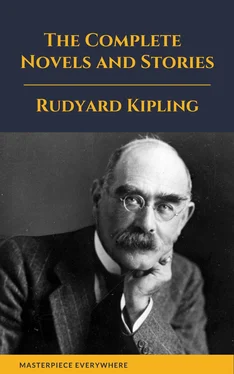Michele was working in his office when he heard the sound that a man never forgets all his life—the “ ah-yah ” of an angry crowd. [When that sound drops about three tones, and changes to a thick, droning ut , the man who hears it had better go away if he is alone.] The Native Police Inspector ran in and told Michele that the town was in an uproar and coming to wreck the Telegraph Office. The Babu put on his cap and quietly dropped out of the window; while the Police Inspector, afraid but obeying the old race-instinct which recognizes a drop of White blood as far as it can be diluted, said:—“What orders does the Sahib give?
The “ Sahib” decided Michele. Though horribly frightened, he felt that, for the hour, he, the man with the Cochin Jew and the menial uncle in his pedigree, was the only representative of English authority in the place. Then he thought of Miss Vezzis and the fifty rupees, and took the situation on himself. There were seven native policemen in Tibasu, and four crazy smooth-bore muskets among them. All the men were grey with fear, but not beyond leading. Michele dropped the key of the telegraph instrument, and went out, at the head of his army, to meet the mob. As the shouting crew came round a corner of the road, he dropped and fired; the men behind him loosing instinctively at the same time.
The whole crowd—curs to the back-bone—yelled and ran; leaving one man dead, and another dying in the road. Michele was sweating with fear; but he kept his weakness under, and went down into the town, past the house where the Sub-Judge had barricaded himself. The streets were empty. Tibasu was more frightened than Michele, for the mob had been taken at the right time.
Michele returned to the Telegraph-Office, and sent a message to Chicacola asking for help. Before an answer came, he received a deputation of the elders of Tibasu, telling him that the Sub-Judge said his actions generally were “unconstitutional,” and trying to bully him. But the heart of Michele D’Cruze was big and white in his breast, because of his love for Miss Vezzis, the nurse-girl, and because he had tasted for the first time Responsibility and Success. Those two make an intoxicating drink, and have ruined more men than ever has Whisky. Michele answered that the Sub-Judge might say what he pleased, but, until the Assistant Collector came, the Telegraph Signaller was the Government of India in Tibasu, and the elders of the town would be held accountable for further rioting. Then they bowed their heads and said:—“Show mercy!” or words to that effect, and went back in great fear; each accusing the other of having begun the rioting.
Early in the dawn, after a night’s patrol with his seven policemen, Michele went down the road, musket in hand, to meet the Assistant Collector who had ridden in to quell Tibasu. But, in the presence of this young Englishman, Michele felt himself slipping back more and more into the native; and the tale of the Tibasu Riots ended, with the strain on the teller, in an hysterical outburst of tears, bred by sorrow that he had killed a man, shame that he could not feel as uplifted as he had felt through the night, and childish anger that his tongue could not do justice to his great deeds. It was the White drop in Michele’s veins dying out, though he did not know it.
But the Englishman understood; and, after he had schooled those men of Tibasu, and had conferred with the Sub-Judge till that excellent official turned green, he found time to draught [draft] an official letter describing the conduct of Michele. Which letter filtered through the Proper Channels, and ended in the transfer of Michele up-country once more, on the Imperial salary of sixty-six rupees a month.
So he and Miss Vezzis were married with great state and ancientry; and now there are several little D’Cruzes sprawling about the verandahs of the Central Telegraph Office.
But, if the whole revenue of the Department he serves were to be his reward, Michele could never, never repeat what he did at Tibasu for the sake of Miss Vezzis the nurse-girl.
Which proves that, when a man does good work out of all proportion to his pay, in seven cases out of nine there is a woman at the back of the virtue.
The two exceptions must have suffered from sunstroke.
▲▲▲
What is in the Brahman’s books that is in the Brahman’s heart. Neither you nor I knew there was so much evil in the world.
Hindu Proverb .
This began in a practical joke; but it has gone far enough now, and is getting serious.
Platte, the Subaltern, being poor, had a Waterbury watch and a plain leather guard.
The Colonel had a Waterbury watch also, and, for guard, the lip-strap of a curb-chain. Lip-straps make the best watch-guards. They are strong and short. Between a lip-strap and an ordinary leather-guard there is no great difference; between one Waterbury watch and another none at all. Everyone in the Station knew the Colonel’s lip-strap. He was not a horsey man, but he liked people to believe he had been one once; and he wove fantastic stories of the hunting-bridle to which this particular lip-strap had belonged. Otherwise he was painfully religious.
Platte and the Colonel were dressing at the Club—both late for their engagements, and both in a hurry. That was Kismet . The two watches were on a shelf below the looking-glass—guards hanging down. That was carelessness. Platte changed first, snatched a watch, looked in the glass, settled his tie, and ran. Forty seconds later, the Colonel did exactly the same thing; each man taking the other’s watch.
You may have noticed that many religious people are deeply suspicious. They seem—for purely religious purposes, of course—to know more about iniquity than the Unregenerate. Perhaps they were specially bad before they became converted! At any rate, in the imputation of things evil, and in putting the worst construction on things innocent, a certain type of good people may be trusted to surpass all others. The Colonel and his Wife were of that type. But the Colonel’s wife was the worst. She manufactured the Station scandal, and —talked to her ayah ! Nothing more need be said. The Colonel’s Wife broke up the Laplace’s home. The Colonel’s Wife stopped the Ferris-Haughtrey engagement. The Colonel’s Wife induced young Buxton to keep his wife down in the Plains through the first year of the marriage. Whereby little Mrs. Buxton died, and the baby with her. These things will be remembered against the Colonel’s Wife so long as there is a regiment in the country.
But to come back to the Colonel and Platte. They went their several ways from the dressing-room. The Colonel dined with two Chaplains, while Platte went to a bachelor-party, and whist to follow.
Mark how things happen! If Platte’s sais had put the new saddle-pad on the mare, the butts of the territs would not have worked through the worn leather and the old pad into the mare’s withers, when she was coming home at two o’clock in the morning. She would not have reared, bolted, fallen into a ditch, upset the cart, and sent Platte flying over an aloe-hedge on to Mrs. Larkyn’s well-kept lawn; and this tale would never have been written. But the mare did all these things, and while Platte was rolling over and over on the turf, like a shot rabbit, the watch and guard flew from his waistcoat—as an Infantry Major’s sword hops out of the scabbard when they are firing a feu de joie —and rolled and rolled in the moonlight, till it stopped under a window.
Platte stuffed his handkerchief under the pad, put the cart straight, and went home.
Mark again how Kismet works! This would not happen once in a hundred years. Towards the end of his dinner with the two Chaplains, the Colonel let out his waistcoat and leaned over the table to look at some Mission Reports. The bar of the watch-guard worked through the buttonhole, and, the watch—Platte’s watch—slid quietly on to the carpet. Where the bearer found it next morning and kept it.
Читать дальше












